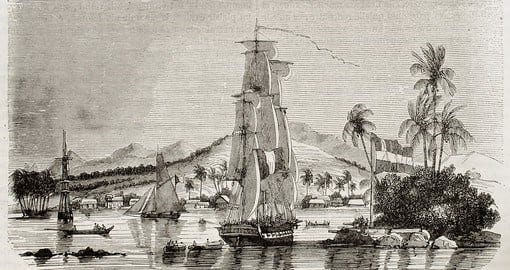The purpose of the Bounty’s transoceanic voyage was to bring fruit plants, particularly breadfruit - a high-yield fruit tree native to the South Pacific - to the Caribbean as a food source for slaves.
The ship itself was not large or distinctive. Since it could only carry 44 crew, the Admiralty combined the role of senior officer with purser; the crew member responsible for managing and controlling the ship’s stores. The Admiralty appointed this person as a lieutenant and gave the role to William Bligh.
The rest of the crew’s roles were typically skill-based for the time, with the inclusion of two gardeners to look after the fruit tree cargo. As Naval service was a young man’s game, the ages of the crew leant towards the mid-20s. Fletcher Christian, as first mate, was 23 when the ship sailed.
Now according to Bligh’s version of events the voyage was trouble-free until they got to Tahiti. But he was not a man who was going to admit any fault whatsoever on his part. From records obtained from other survivors, it appears that during the outgoing voyage disputes over food and its distribution to the crew arose.
Now its well known that Navy life back then was extremely difficult. But one thing a Navy man could always count on was a decent supply of food onboard. Every man onboard had a food allocation, with meat, bread, cheese and beer. Officers also had the option to bring aboard their own food. They received credit for any of the Navy-supplied food they did not consume.
All Navy men took their food allocation very seriously, even more than their wages. Since a voyage to the Pacific was a long one, the ship would need to re-supply on the way. The Navy had a clear policy that if certain foods were not available, Navy men could be compensated with an alternative of similar value.
So, when a ship’s captain – who also happened to be the purser in charge of allocating food stores – begins withholding food from everyone, then resentments quickly grow.
That’s because the only reason a purser would withhold food was to line his own pockets.
And when the purser was the foul-tempered and impossible-to-please Captain William Bligh, trouble began to brew among all the crew, including the officers.
In Tahiti
By the time Bounty arrived in Tahiti, Bligh had succeeded in alienating nearly everybody onboard.
One of those who took his criticism particularly hard was Fletcher Christian. Christian and Bligh’s friendliness had dissipated, Bligh would say later, because Christian was embarrassed by Bligh loaning him money in Cape Town. Christian told others that it was Bligh’s verbal abusiveness and his constant public reminders of the debt Christian owed to him that had him ‘in hell’; an indication that perhaps he was beginning to descend into mental ill-health.
But Bligh did not limit his abusiveness to just Christian:
‘Such neglectful and worthless petty officers I believe never was in a ship as are in this,’ he lamented in his ship’s log. ‘They have drove me to ever thing but corporal punishment and that must follow if they do not improve.’
Nevertheless, when Bounty finally made landfall in Tahiti, Bligh allowed the men the freedom to stay on the islands as he searched out the plants needed for the Bounty’s cargo and wined and dined with the local rulers.
For a bunch of repressed Englishmen, life on Tahiti was idyllic and carefree. The women were unburdened by the sexual repressions of Christianity and happily succumbed to their attentions. They each ‘took a wife’ (apparently consensually) and some even got themselves tattooed in the Tahitian tradition.
Bligh himself was largely silent on his time in Tahiti (perhaps to protect his wife’s sensibilities of what he too was up to with the local women?) but the survivors reported that he still punished them physically for misdemeanors and even threatened to do the same for the officers, a grave offence under Naval law. That said, they also did the absolute bare minimum of work onboard.
Most historians have taken Bligh’s word for this assessment of the poor character of his officers. Yet perhaps Bligh’s combative and temperamental personality merely brought out the worst in everyone around him.
After all, there is only so much verbal abuse people can take before they just do not hear you anymore.
And it would not be long before the crew acted on it.




